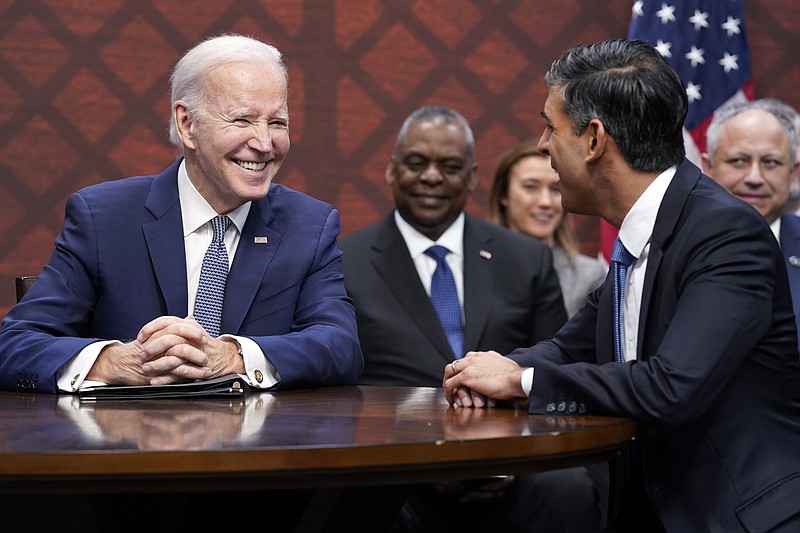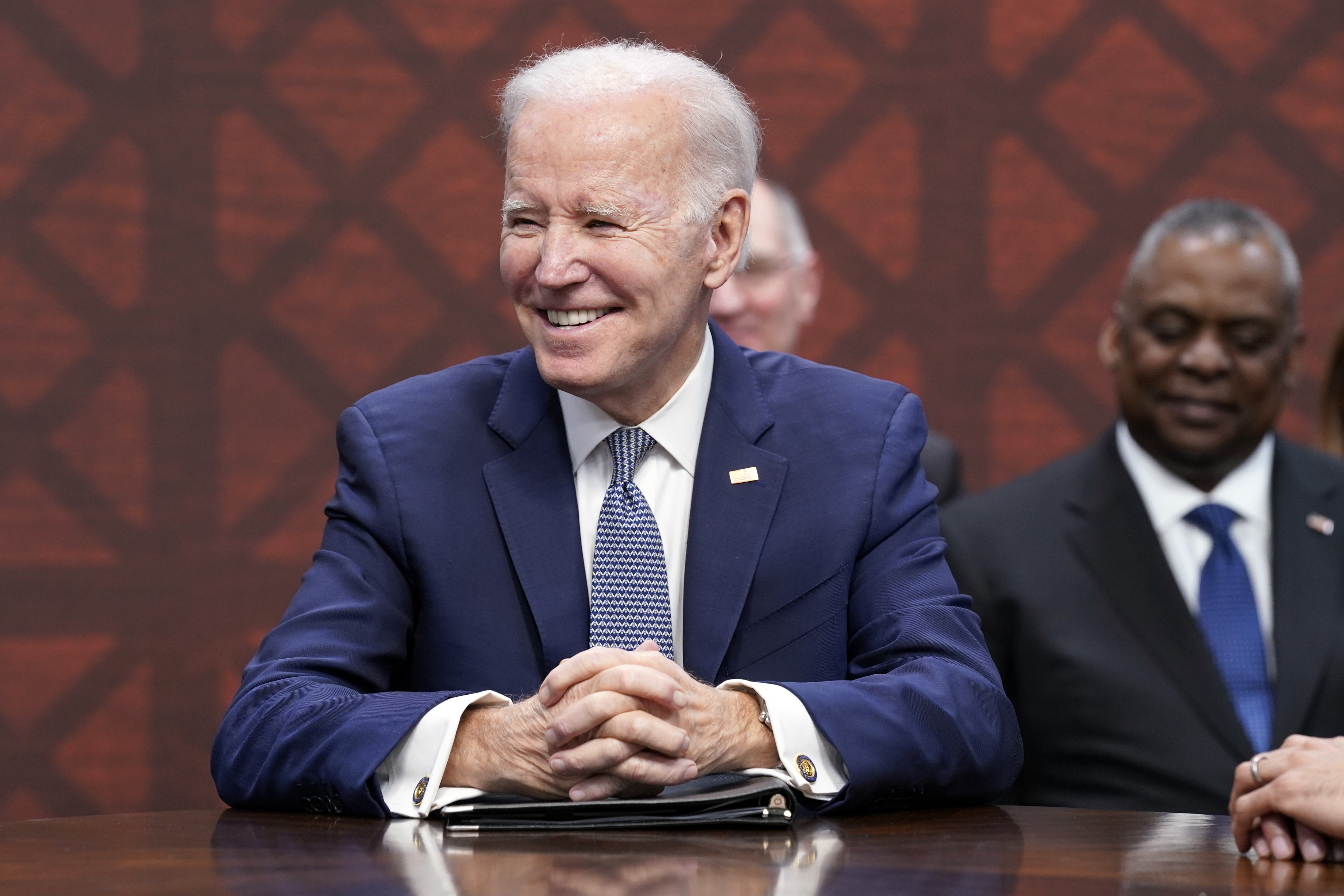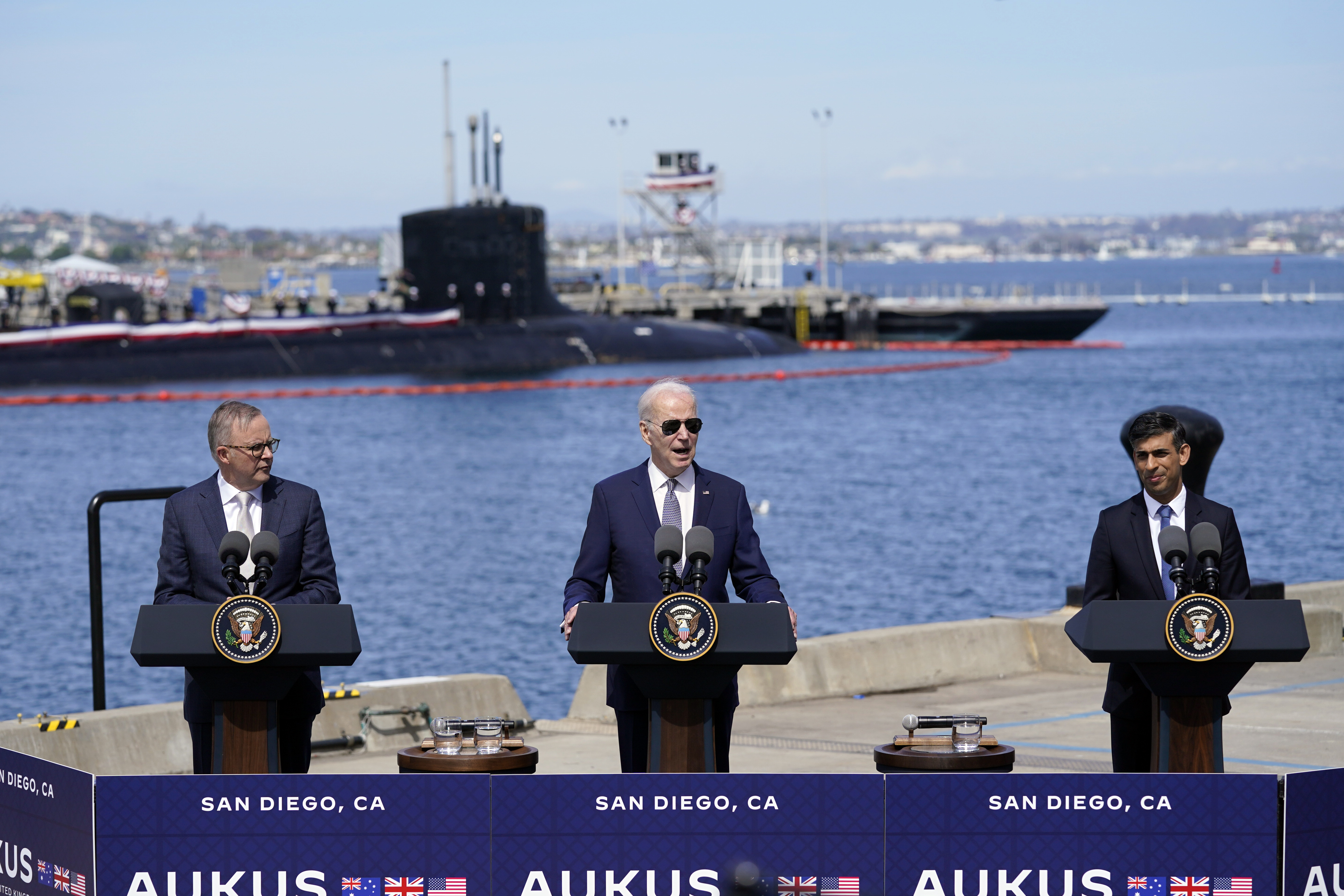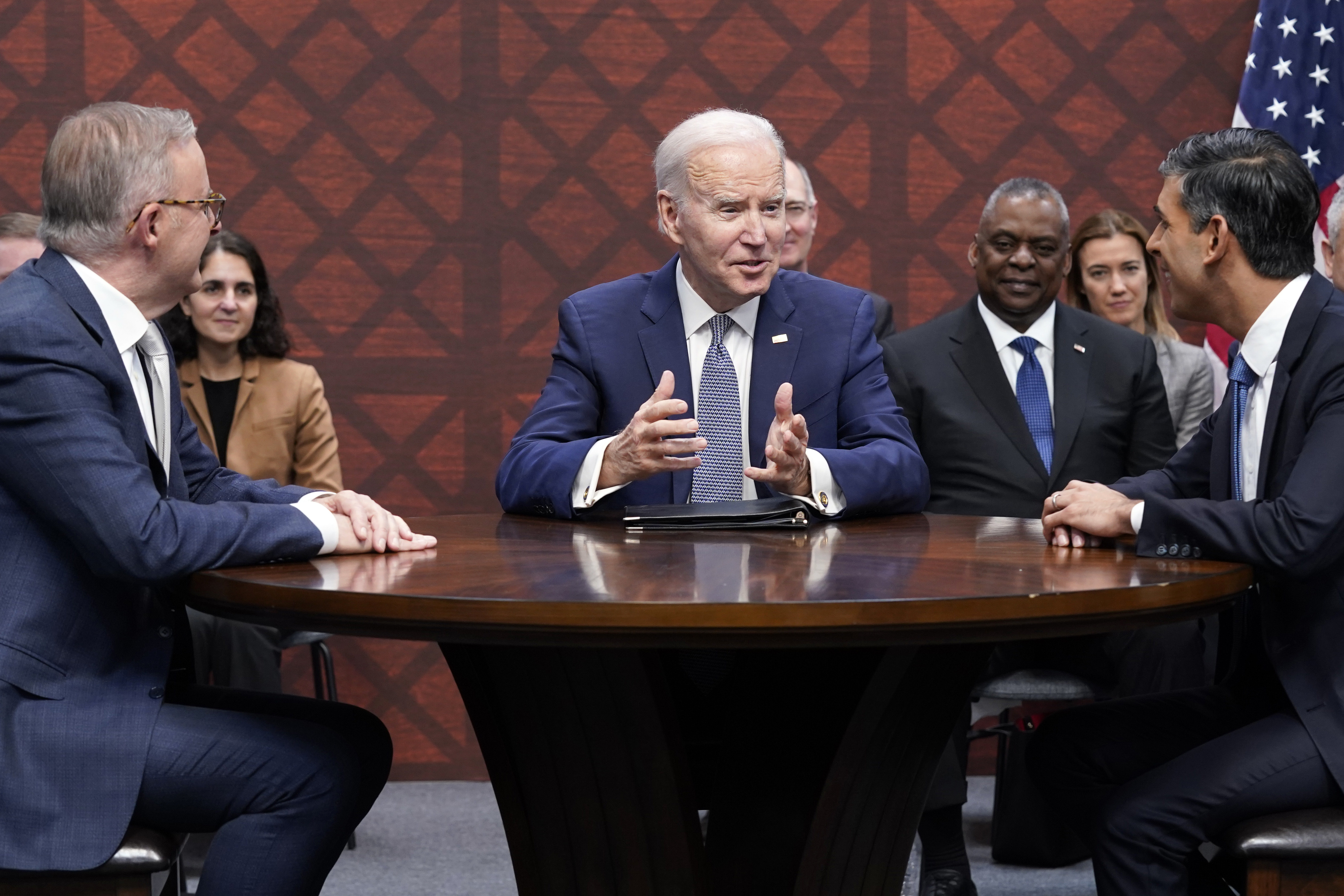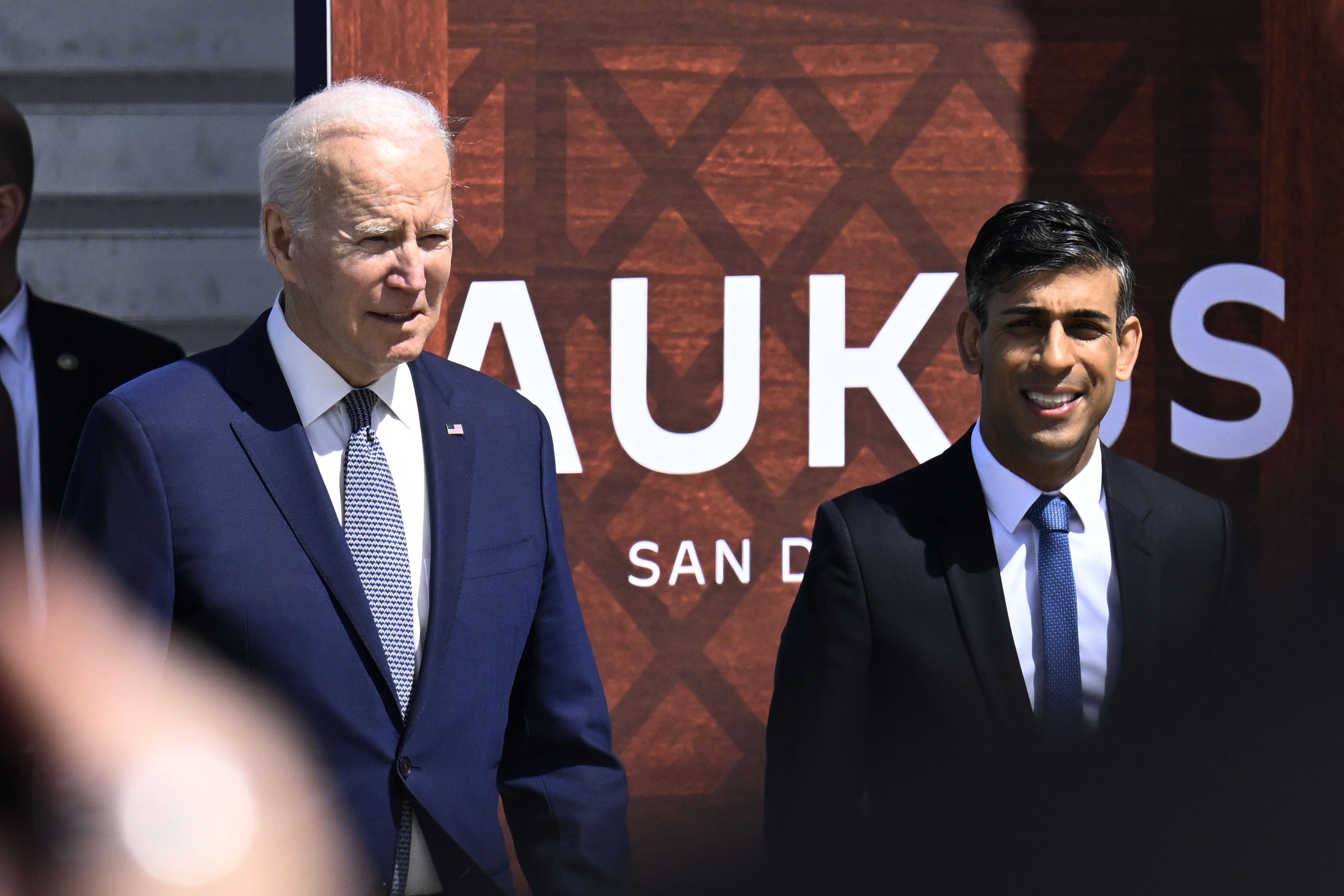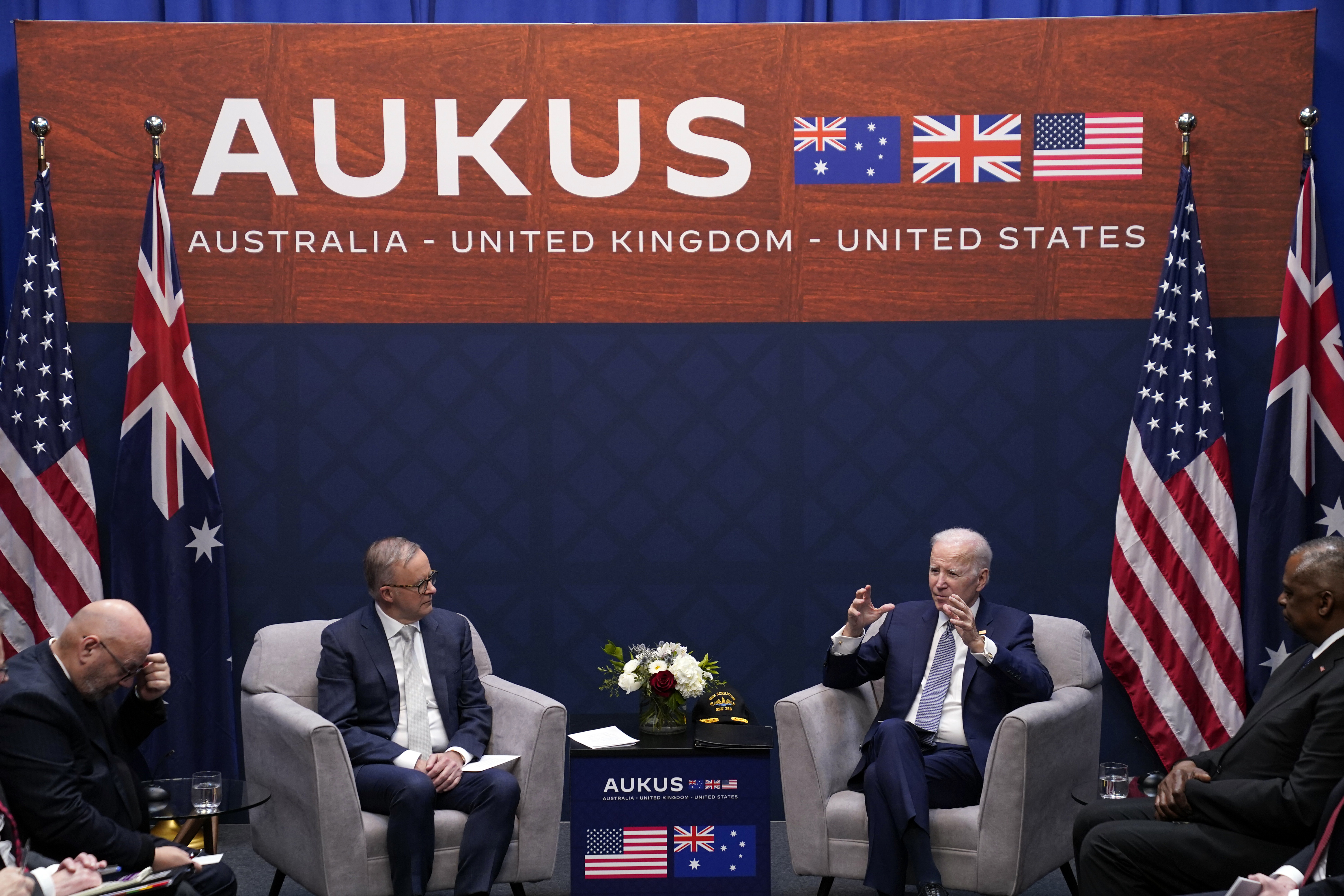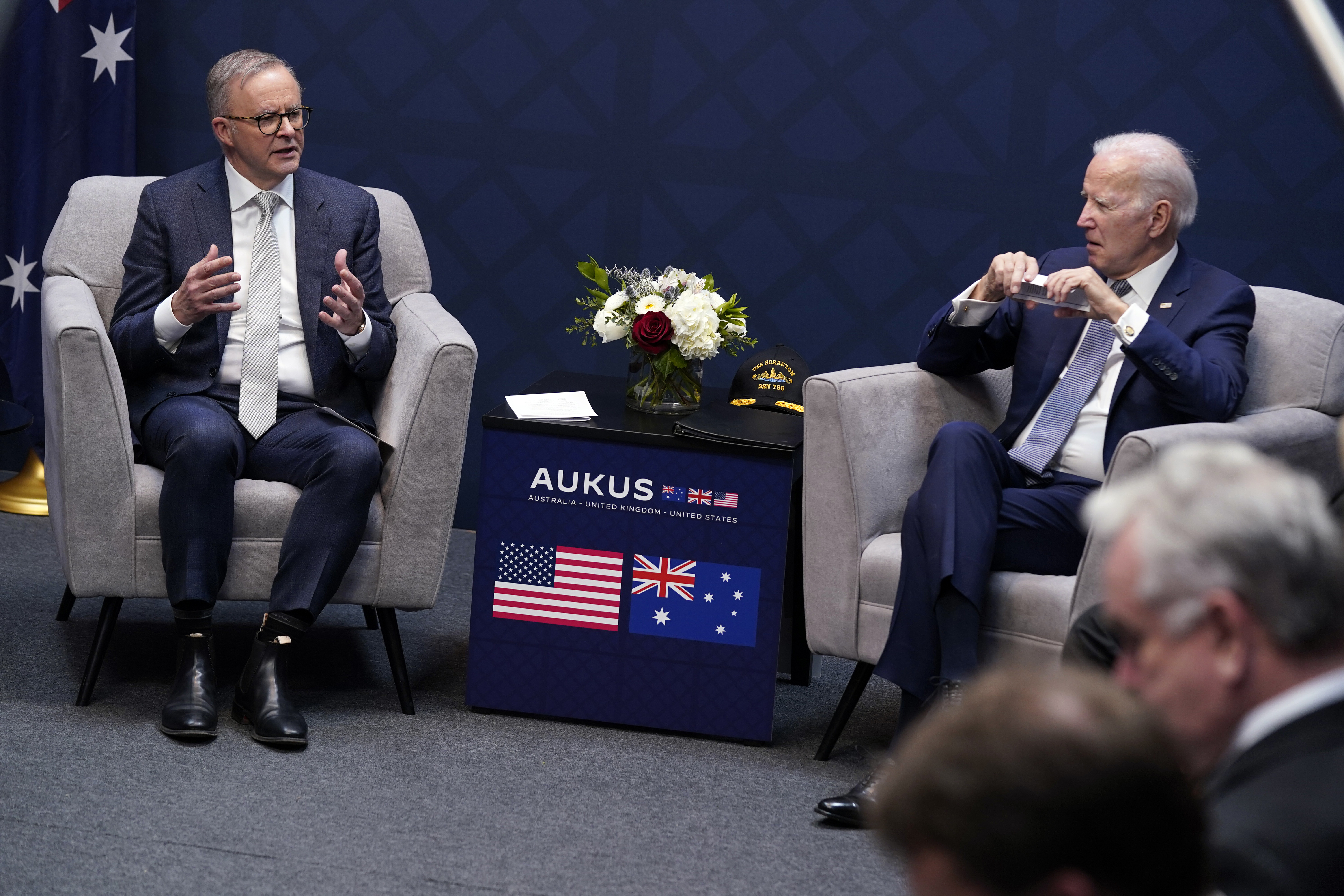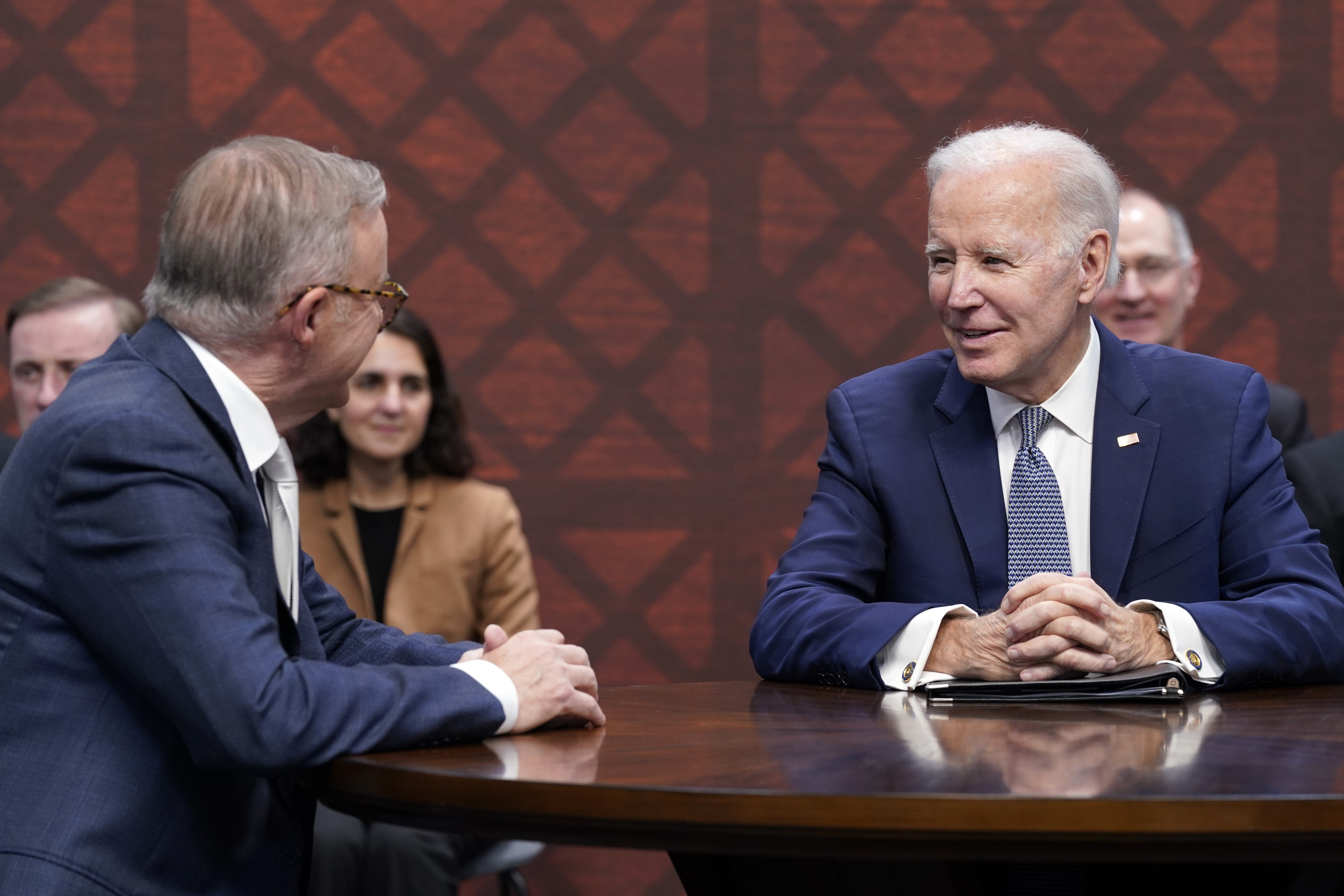SAN DIEGO -- President Joe Biden and the leaders of Australia and the United Kingdom on Monday announced that Australia will purchase nuclear-powered attack submarines from the U.S. to modernize its fleet amid growing concern about China's influence in the Indo-Pacific.
Biden flew to San Diego to appear with Australian Prime Minister Anthony Albanese and British Prime Minister Rishi Sunak as they hailed an 18-month-old nuclear partnership given the acronym AUKUS -- for Australia, the United Kingdom and the United States.
The partnership, announced in 2021, enables Australia to access nuclear-powered submarines, which are stealthier and more capable than conventionally powered vessels, as a counterweight to China's military buildup.
Biden, appearing sensitive to tensions with China and its criticism of the deal, stressed that the submarines are "nuclear-powered, not nuclear-armed."
"These boats will not have any nuclear weapons of any kind of them," he said at an outdoor ceremony at Naval Base Point Loma in San Diego, where he was flanked by Albanese and Sunak. Two submarines, the USS Missouri and the USS Charlotte, were tied up at the next pier in the Pacific Ocean behind the leaders.
Albanese said the agreement "represents the biggest single investment in Australia's defense capability in all of our history." It's also the first time in 65 years that the U.S. has shared its nuclear propulsion technology, "and we thank you for it," he said.
Sunak called AUKUS "the most significant multilateral defense partnership in generations." He said the U.K. also will share its 60 years of experience running its own submarine fleet with Australian engineers "so they can build their own fleet."
In a joint statement before the formal announcement, the leaders said their countries have worked for decades to sustain peace, stability and prosperity around the world, including in the Indo-Pacific.
"We believe in a world that protects freedom and respects human rights, the rule of law, the independence of sovereign states and the rules-based international order," they said in the statement, released before their joint appearance in San Diego.
"The steps we are announcing today will help us to advance these mutually beneficial objectives in the decades to come," they said.
San Diego is Biden's first stop on a three-day trip to California and Nevada. He will discuss gun violence prevention in Monterey Park, Calif., where 11 people were killed in a January mass shooting, and his plans to lower prescription drug costs in Las Vegas. The trip will include fundraising stops as Biden steps up his political activity before an expected reelection announcement next month.
A fundraiser in Rancho Santa Fe, Calif., Monday night was expected to include about 40 attendees and raise $1 million for Democrats, according to a Democratic National Committee official.
Australia will first buy three nuclear-powered submarines from the United States -- with the option to add two more -- that would be delivered starting in 2032, Sullivan said. A future generation of submarines will be built in the U.K. and Australia with U.S. technology and support.
As part of the agreement, the United States and Britain will rotate nuclear-powered submarines into port in Perth, Australia, by 2027. One such submarine, the USS Asheville, is there now on a port visit, before the formal schedule of rotations.
Australian engineers will also work on production sites in the United States and Britain. The first of the new class of British-made submarines are expected to be delivered to the British navy by the late 2030s, before Australia builds the next batch at a new shipyard in Adelaide. Australian officials hope to complete their first submarine in 2042.
Under the deal, the U.K. and Australia will build new nuclear-powered, conventionally armed subs from a British design, with U.S. technology and support. Most of the U.K. construction will take place in shipyards at Barrow-in-Furness in northwest England, with the first subs completed by the late 2030s.
"It's tying the United Kingdom, a European power, to Australia, a Pacific power, with the United States as the glue holding this new partnership together," said Jake Sullivan, White House national security adviser. "And it's a manifestation of a broader encouragement that the president has offered to European allies to be more engaged in Asia and Asian allies like Japan and Korea to be more involved in Europe."
The three leaders said the submarine plan "elevates all three nations' industrial capacity to produce and sustain interoperable nuclear-powered submarines for decades to come, expands our individual and collective undersea presence in the Indo-Pacific and contributes to global security and stability."
Nuclear submarines can stay underwater longer and travel farther than conventional submarines without surfacing. They are a substantial upgrade over the Australian navy's six diesel electric submarines, which will soon age out of service. The nuclear-powered submarines are the headline items of the AUKUS arrangement, which also includes long-term plans to cooperate on artificial intelligence, quantum computing, cyberwarfare and missiles.
Biden also met individually with Sunak and Albanese, an opportunity to coordinate strategy on Russia's war in Ukraine, the global economy and more.
Sunak invited Biden, who is of Irish descent, to visit Northern Ireland in April to help celebrate the 25th anniversary of its peace accord, the 1998 Good Friday agreement. Biden replied that it is his "intention" to go to Northern Ireland and the Republic of Ireland.
During a subsequent meeting with Albanese, Biden said he planned to visit Australia in May for meetings that will include the leaders of Japan and India.
Biden views the partnerships and alliances in the region as cornerstones for U.S. strategy for years to come. Asked if AUKUS would survive if a new, more isolationist president was elected -- a veiled reference to Donald Trump, who is running for another term -- Biden said yes.
The secretly brokered AUKUS deal included the Australian government's cancellation of a $66 billion contract for a French-built fleet of conventional submarines, which sparked a diplomatic row within the Western alliance that took months to mend.
China has argued that the AUKUS deal violates the Nuclear Non-Proliferation Treaty. It contends that the transfer of nuclear weapons materials from a nuclear-weapon state to a non-nuclear-weapon state is a "blatant" violation of the spirit of the pact. Australian officials have pushed back against the criticism, arguing that they are working to acquire nuclear-powered, not nuclear-armed, submarines.
"The question is really how does China choose to respond because Australia is not backing away from what it -- what it seems to be doing in its own interests here," said Charles Edel, a senior adviser and Australia chair at the Center for Strategic and International Studies. "I think that probably from Beijing's perspective they've already counted out Australia as a wooable mid-country. It seemed to have fully gone into the U.S. camp."
Biden downplayed the rivalry with China during his meeting with Albanese.
"I don't view what we're doing as a challenge to anybody," he said.
'EPOCH-DEFINING'
Sunak pledged Monday to increase military funding by $6 billion over the next two years in response to Russia's invasion of Ukraine and the "epoch-defining challenge" posed by China.
The increase, part of a major update to U.K. foreign and defense policy, is less than military officials wanted. Sunak said the U.K. would increase military spending to 2.5% of gross domestic product "in the longer term," but didn't set a date. Britain spends just over 2% of its GDP on defense, and military chiefs want it to rise to 3%.
The extra money will be used, in part, to replenish Britain's ammunition stocks, depleted from supplying Ukraine in its defense against Russia. Some will also go toward a U.K.-U.S.-Australia deal to build nuclear-powered submarines.
"The world has become more volatile, the threats to our security have increased," Sunak told the BBC during a visit to the U.S. "It's important that we protect ourselves against those."
Britain last produced a defense, security and foreign policy framework, known as the Integrated Review, in 2021.
The new report, released Monday, said "there is a growing prospect that the international security environment will further deteriorate in the coming years, with state threats increasing and diversifying in Europe and beyond."
Moscow's February 2022 invasion of Ukraine upended European security order, and the review said Russia poses "the most acute threat to the U.K.'s security."
The U.K. is also increasingly concerned about what the government calls "the epoch-defining challenge presented by the Chinese Communist Party's increasingly concerning military, financial and diplomatic activity."
The defense review said that "wherever the Chinese Communist Party's actions and stated intent threaten the U.K.'s interests, we will take swift and robust action to protect them."
U.K. intelligence agencies have expressed growing concern about China's military might, covert activities and economic muscle. Ken McCallum, head of domestic spy agency MI5, said in November that "the activities of the Chinese Communist Party pose the most game-changing strategic challenge to the U.K." MI5 said in January 2022 that a London-based lawyer had tried to "covertly interfere in U.K. politics" on behalf of the Chinese Communist Party -- including by funneling money to an opposition Labour Party lawmaker.
Concern about Beijing's activities has sparked a government-wide catch-up campaign on China, including Mandarin-language training for British officials and a push to secure new sources of critical minerals that are essential to technology.
The review doesn't brand China as a threat to the U.K., and Sunak has stressed the need for economic ties with China, to the annoyance of more hawkish members of the governing Conservative Party.
"We are sliding toward a new Cold War," said Conservative lawmaker Tobias Ellwood, who chairs the House of Commons Defense Committee. "Threats are increasing, but here we are staying on a peacetime budget."
Speaking as he traveled to the U.S., Sunak said China's Communist government "is increasingly authoritarian at home and assertive abroad, and has a desire to reshape the world order."
But, he added, "you can't ignore China," given the size of its economy.
"It's right to engage with China, on the issues that we can find common ground and make a difference on, for example climate change, global health, macroeconomic stability," he said.
"That's the right approach whilst being very robust in defending our values and our interests."
Information for this article was contributed by Zeke Miller, Darlene Superville and Jill Lawless of The Associated Press and by Michael D. Shear and Edward Wong of The New York Times.
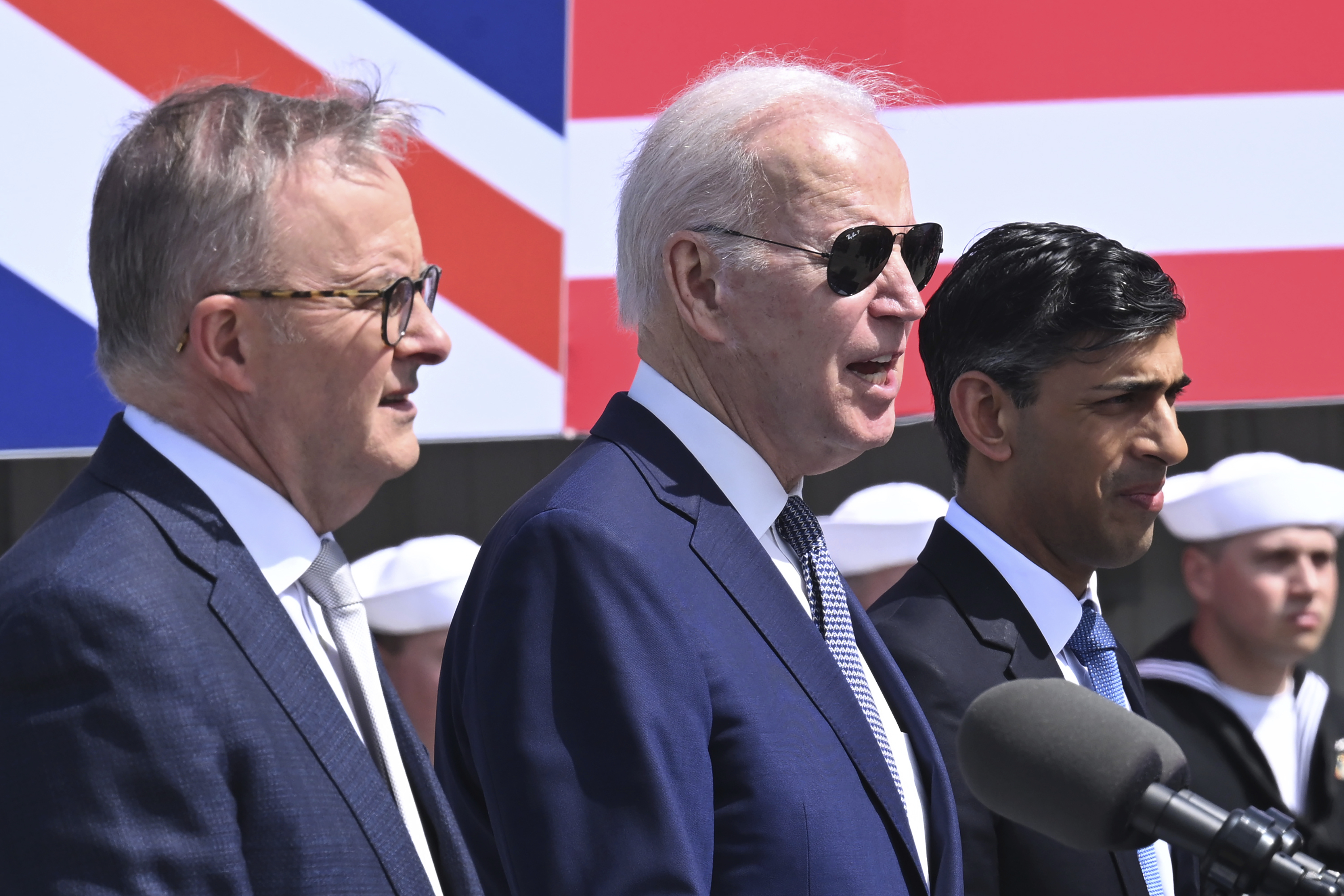 Britain's Prime Minister Rishi Sunak, right, meets with US President Joe Biden and Prime Minister of Australia Anthony Albanese, left, at Point Loma naval base in San Diego, US, Monday March 13, 2023, as part of Aukus, a trilateral security pact between Australia, the UK, and the US. (Leon Neal/Pool via AP)
Britain's Prime Minister Rishi Sunak, right, meets with US President Joe Biden and Prime Minister of Australia Anthony Albanese, left, at Point Loma naval base in San Diego, US, Monday March 13, 2023, as part of Aukus, a trilateral security pact between Australia, the UK, and the US. (Leon Neal/Pool via AP)